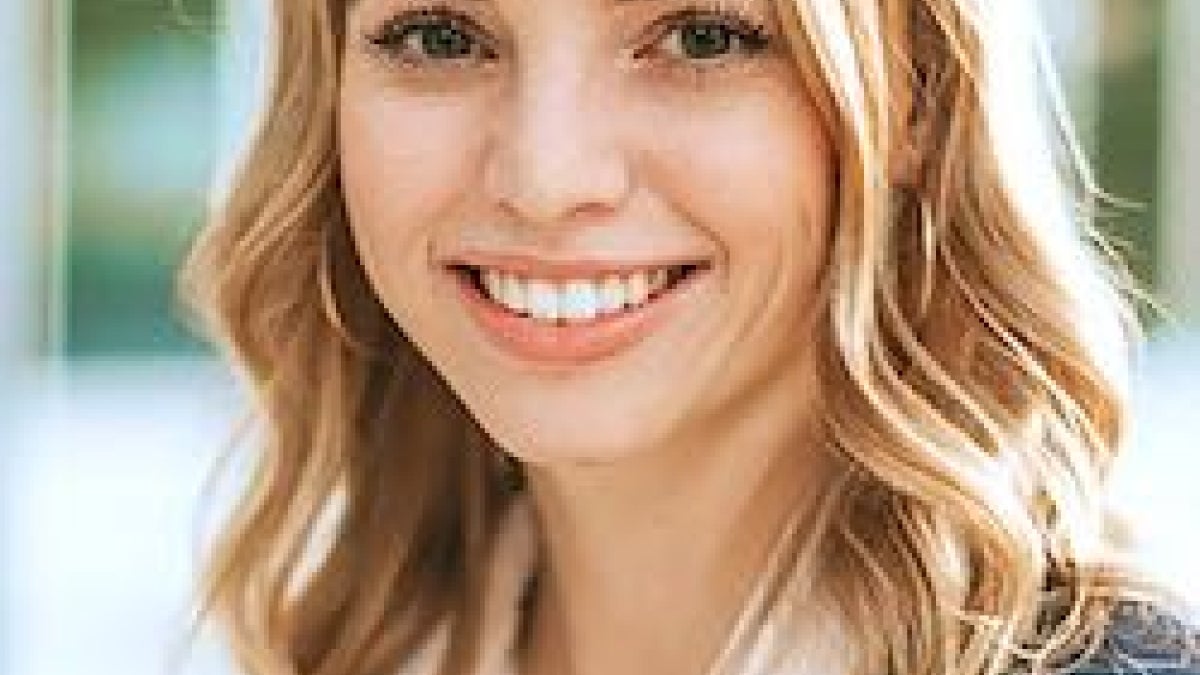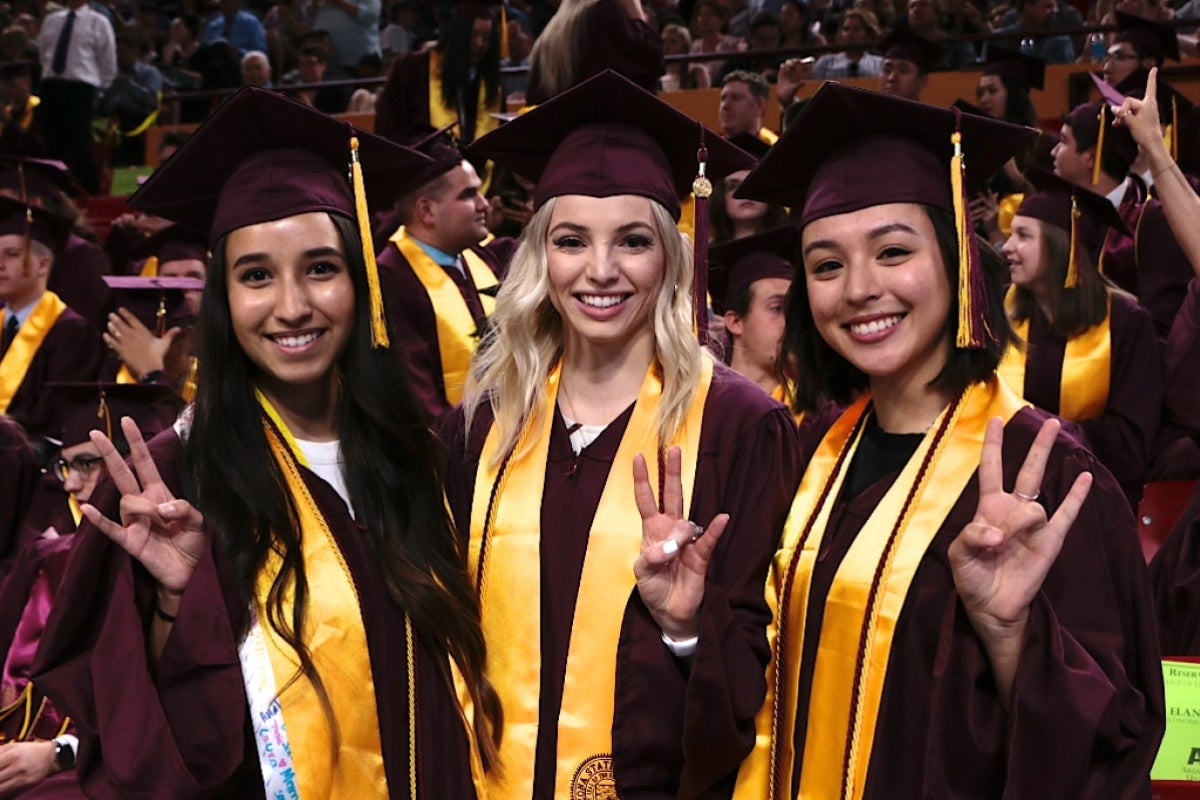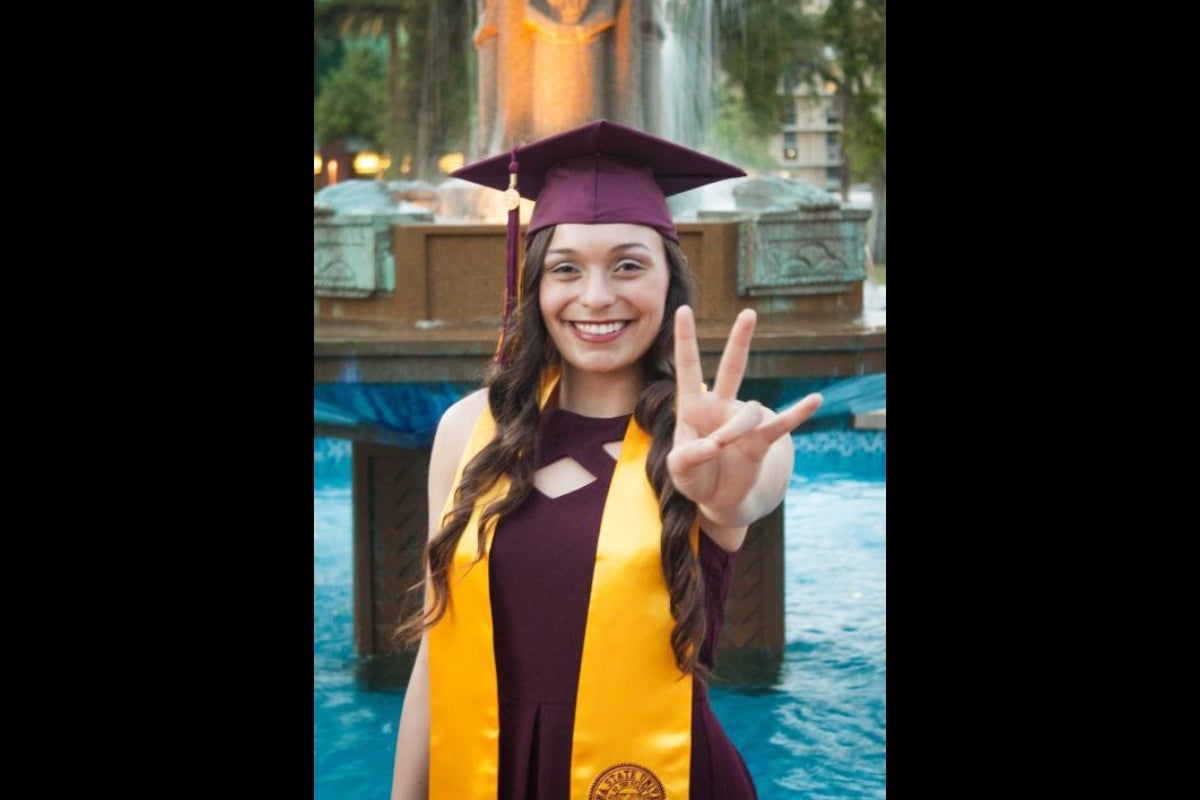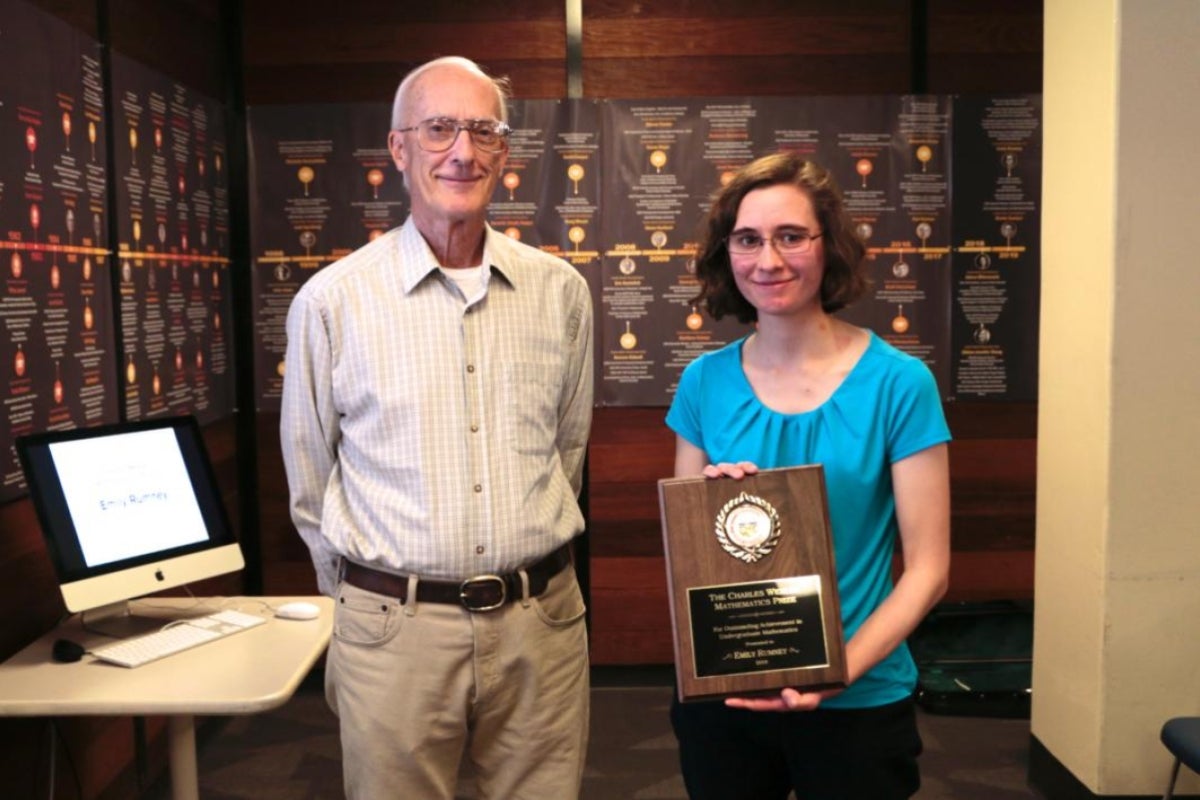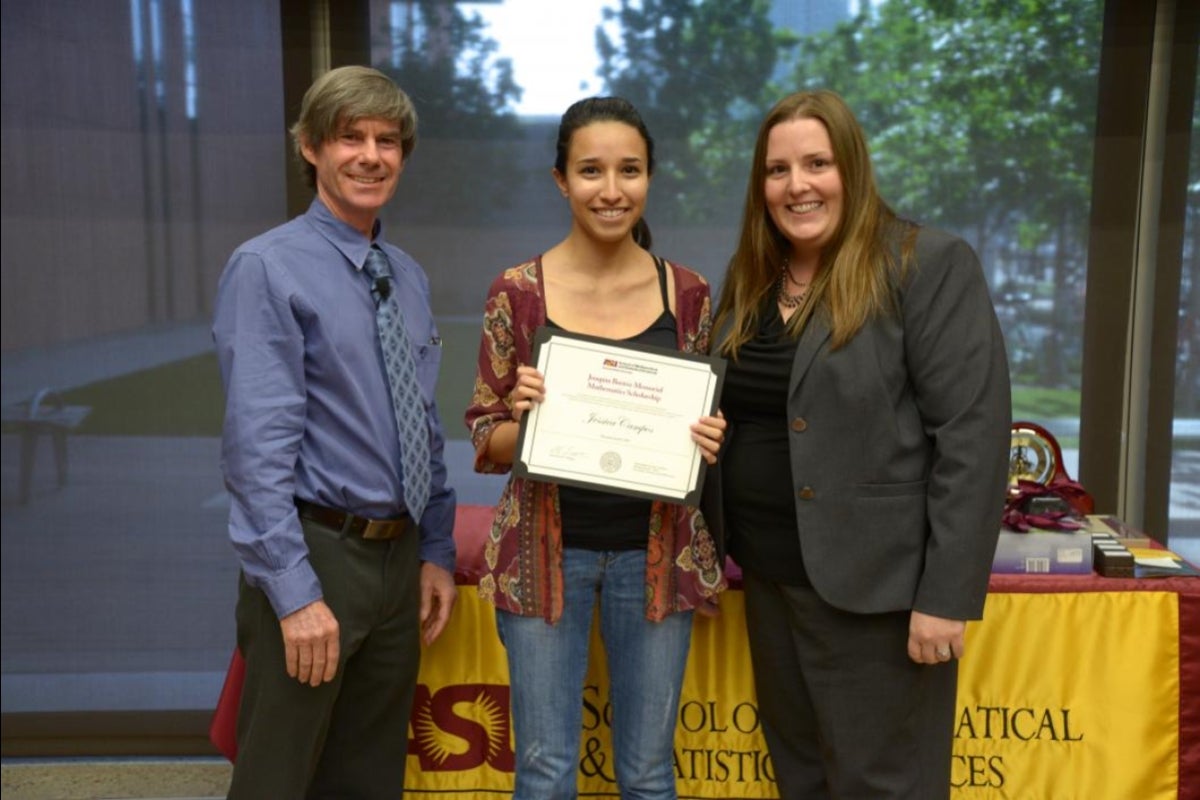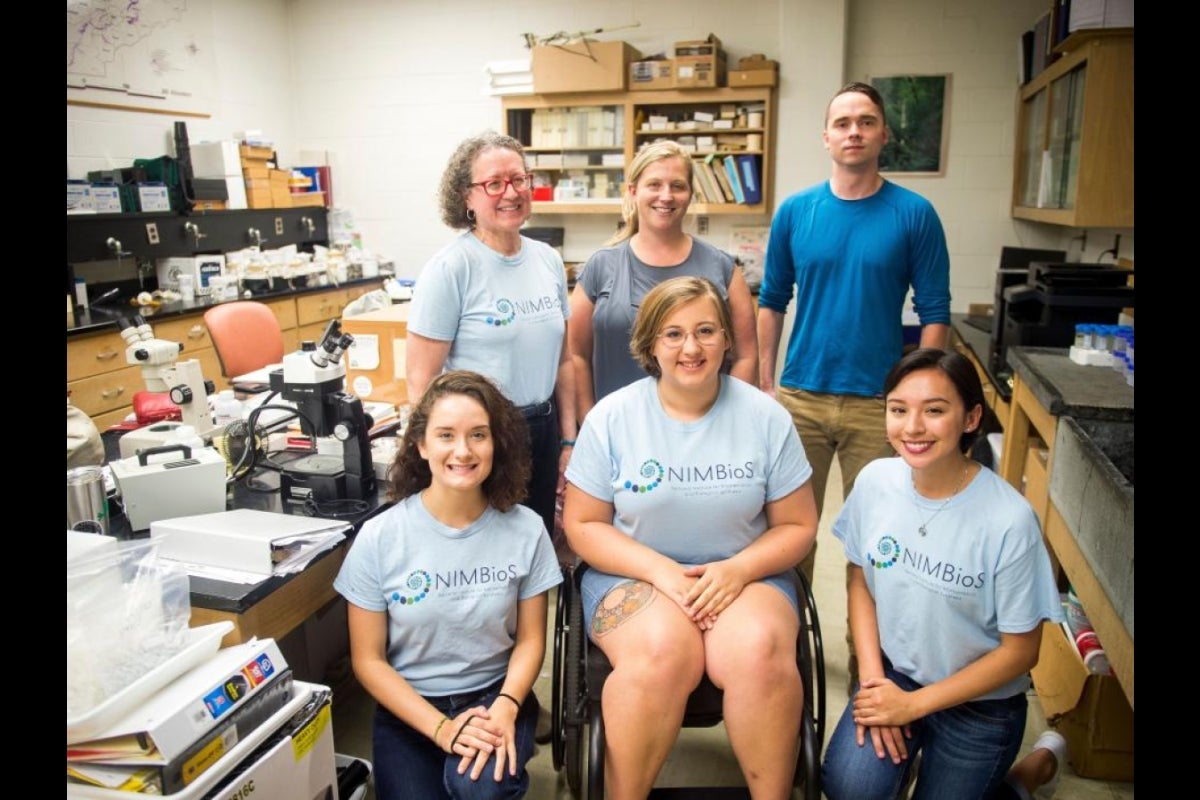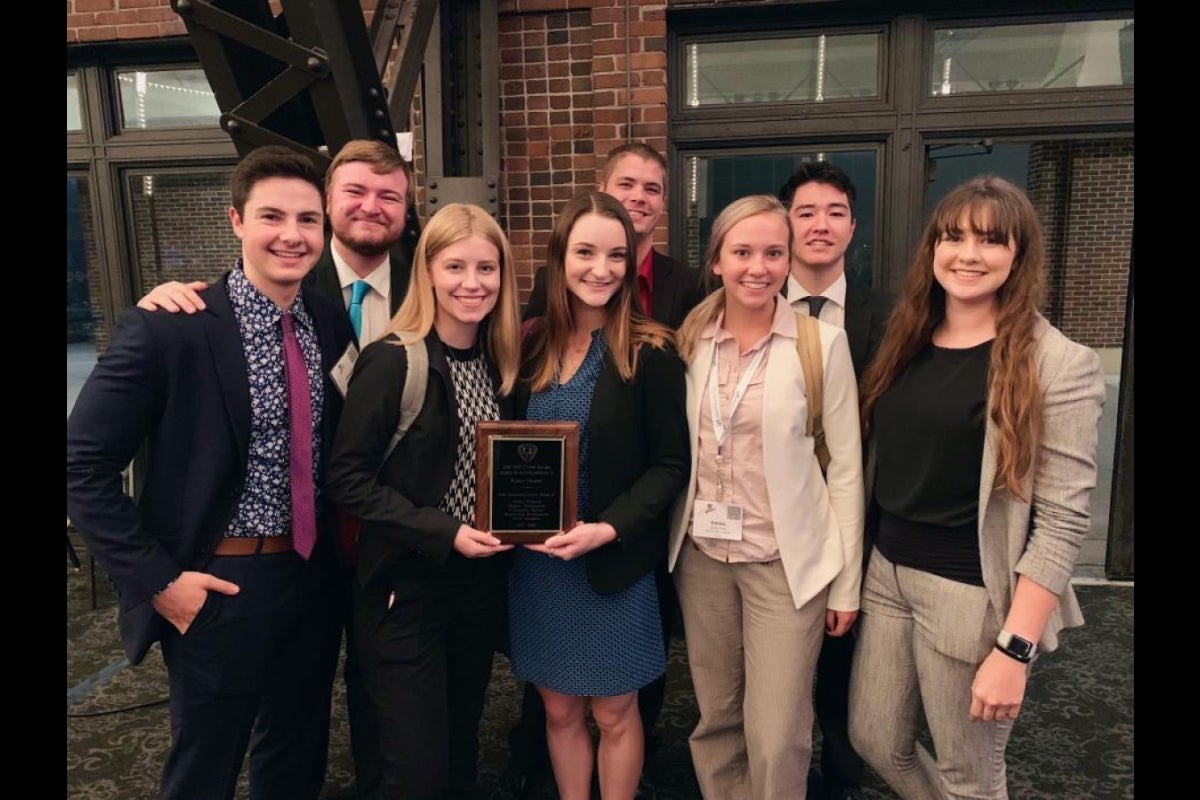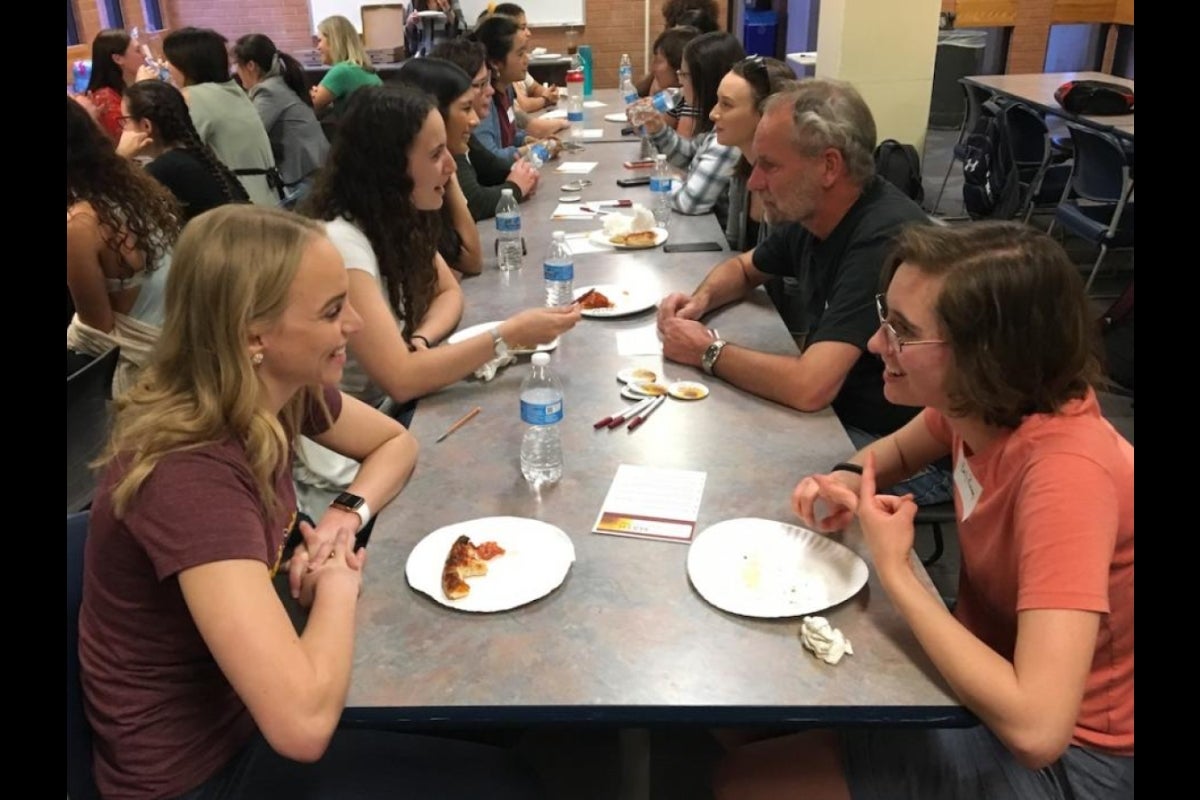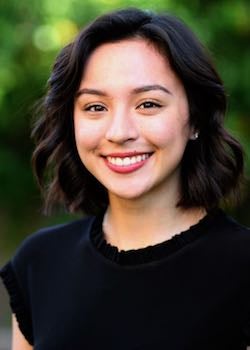Editor’s note: This is part of a series of profiles for spring 2019 commencement.
ASU Now caught up with six recent graduates from the School of Mathematical and Statistical Sciences, who talked about being Sun Devils, their experiences as women in STEM and what their plans are after graduation.
Charly McCown
Bachelor of Science in computational mathematical sciences
Gilbert, Arizona
Question: What are your plans after graduation?
A: After graduation, I am excited to take a little bit of vacation time and then start my career. I will work as a junior quantitative marketing analyst at Carvana on the quantitative marketing team. I am looking forward to this position because it requires the critical thinking and tech skills I learned while pursuing my degree and will allow me to follow my passion for data analysis. I am drawn to Carvana for many reasons, one being that they value mathematical backgrounds. This is important to me because I know they appreciate my education and understand its power. I am also excited to learn about marketing and how analytical skills can be applied for improved performance and results. Aside from my job, I hope to continue my part in encouraging women to pursue STEM careers.
Q: What’s something you learned while at ASU — in the classroom or otherwise — that surprised you, that changed your perspective?
A: After my first coding class (C++) as a freshman at a different university, I thought I would never code again and that it just was not for me. After my transfer to ASU, I had to take Java instead. I was upset about it, but I heard Java was a little easier, so I figured I would give it a shot. The professor was very clear that it was an introductory course, and she put forth such great effort to help first-time coders be successful and not be intimidated. I learned that I could code, and in fact, I was good at it! This completely changed my perspective and even the course of my education and career as I switched from math to computational math.
Q: Which professor taught you the most important lesson while at ASU?
A: Dr. Sharon Crook has taught me many important lessons, but the one that resonates with me the most is one that I learned through her example rather than her teaching. As a part of her lab (ICON Lab), I have had the opportunity to get a closer look at what she does. She has been a role model to me as a woman and mother in STEM, and I am inspired when I hear of the things she is involved in like committees, grants, papers, traveling to conferences and more. I also see that through these busy times, she continues to make time to mentor and involve undergraduates such as myself in her research. She strives to provide me and other undergraduates with the opportunities we need to gain experience and be successful. She has taught me not only that it is possible to be a successful woman and mother in STEM, but also the importance of helping others find that success as well.
Q: What’s the best piece of advice you’d give to those still in school?
A: My best advice is to be proactive in your education and gaining experience, as well as forming genuine relationships with people. Actively search out opportunities to get involved with clubs, research, internships, jobs, events and groups that will give you the experience you need. Make friends and connections in your major and other majors, form study groups, meet as many people as you can, and form authentic connections with those people. Support your peers and help them find success. Remember the people who have influenced your path and helped you along the way, then give back by taking opportunities to be that person for someone else.
Q: What is most misunderstood about mathematics by the general public?
A: Mathematics is not just arithmetic. Mathematics majors are not human calculators, and it does not discredit their mathematical ability if they do not calculate your arithmetic problem on the spot.
Q: Why is mathematics a great major for women to pursue in college?
A: Mathematics is a great major for women because it is empowering. Options give you power, and if any degree is going to give you options, it is a math degree. It is also a great major for those unsure of what they want to do, since the skills learned are very transferrable over different fields and can be applied in many different ways. Additionally, the skills learned in a math degree are sought after by employers, which allows for a wide array of options for the future — whether it be in academia or industry.
Q: What advice would you share with undergraduate women thinking of pursuing a math major?
A: If you are considering pursuing a math major, then do it! It is not an easy path by any means, but it is very possible to be successful! It was a quite fulfilling major for me, and there were a few things about it that I would like to point out. When pursuing a degree in math, try to be proactive about finding what you are passionate about. That does not mean you have to figure it out any time soon, but get exposure to what's out there, because there is A LOT out there. The variety of ways you can apply your math degree means you are likely to find something you are excited about. Another would be to get support from many different places. You are not doing this alone. Support and advice from peers, clubs, professors, mentors, bosses, family, friends, and even successful people you have never met but would like to, can be invaluable, and many times you need to be the one to reach out and ask for it. Finally, don't let anyone tell you that you can't do it. You own your future, and whatever you choose should be what will lead you to what you want in life. In many of my classes, as a woman, I was the minority. Don't let this intimidate you — let it motivate and empower you.
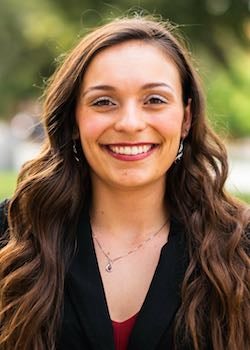
Sierra Murphy
Sierra Murphy
Bachelor of Science in mathematics, Bachelor of Science in biological sciences (biomedical sciences), Bachelor of Arts in chemistry
Marin County, California
Q: What are your plans after graduation?
A: I will continue researching cancer vaccines at the ASU Biodesign Institute. I plan to start medical school in Fall 2020.
Q: What’s something you learned while at ASU — in the classroom or otherwise — that surprised you, that changed your perspective?
A: I learned that I love research. I never imagined this for myself. I though research would be too difficult or frustrating or boring. It isn’t. It’s the root of science: experiment. I love research especially because all of my majors factor into it. Biology is the main subject (cancer vaccines) but the data analysis/interpretation/designing the experiment is mathematics, and chemistry is all the tests we use to identify information about the tissues etc.
Q: Which professor taught you the most important lesson while at ASU?
A: Dr. Don Jones taught me that there is a difference between learning to learn and learning to pass a class. This has really helped me prioritize knowledge over scores.
Q: What’s the best piece of advice you’d give to those still in school?
A: Be good to you and be proud of yourself, first and foremost. Empower rather than compete. Be authentic to who you are. One of the best decisions I made in college was to not share my grades/test scores. Coming from a pre-med background, I saw so many people lose themselves to stress and competition and what looks best on their resume. I realized that comparing grades only succeeds in making someone feel bad. So now when people ask, I politely decline. After I made this decision, I started to become less of a perfectionist and truly accepted myself. I became proud of my efforts rather than my scores.
Q: What is most misunderstood about mathematics by the general public?
A: I think everyone has some form of math anxiety because they think they’re not good at it. Yes, there are people who start out with a natural mathematics ability, but mathematics can be learned if you keep an open mind. Anyone is capable of improving in math. I also think you don’t necessarily need to be extremely good at math to gain from it. Math teaches you so much, not just content wise, but it teaches you how to problem solve. So I think the most misunderstood thing is that mathematicians never fail, I believe we fail the most, but we also get back up one time more than we fail.
Q: Why is mathematics a great major for women to pursue in college?
A: Mathematics is a great major because it develops skills that directly translate to life. It challenges you to keep working until you find solutions to complex problems and teaches you to pursue your goals with tenacity. This is especially important for young women because there will always be people telling them that they’re not capable. To that, I say, the ceilings wouldn’t be made of glass if we weren’t meant to see beyond them.
Q: What advice would you share with undergraduate women thinking of pursuing a math major?
A: My advice to undergraduate women thinking of pursuing a major in mathematics is to never compare yourself to your peers and instead look at how far you’ve come. Don’t be afraid to ask for help and definitely lend help whenever you can. Build connections: I met two of my best friends through mathematics at ASU. These women are ambitious, intelligent, kind, inspiring, strong and unstoppable.
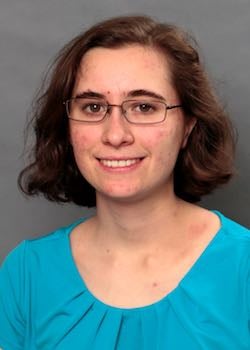
Emily Rumney
Emily Rumney
Bachelor of Arts in mathematics and a Bachelor of Music in violin performance
Tucson, Arizona
Q: What are your plans after graduation?
A: In the fall, I will begin a two-year Master of Music degree program in violin performance at the Chicago College of Performing Arts at Roosevelt University, where I will be studying under the guidance of Almita Vamos and MingHuan Xu.
Q: What’s something you learned while at ASU — in the classroom or otherwise — that surprised you, that changed your perspective?
A: One thing that has surprised me was how I was able to find such a tight community in what at first seemed like an impossibly large school.
Q: Which professor taught you the most important lesson while at ASU?
A: The most important lesson I learned while at ASU was to believe I was capable of tackling difficult problems, whether in mathematics or in playing the violin, and to persist in my efforts to solve those problems. My violin professor, Dr. Katherine McLin, has held me to a very high standard of performance while giving me support and encouragement along the way, and has helped me to transform my playing. Dr. Matthias Kawski’s Introduction to Topology course pushed me to think about more abstract concepts than I ever had before, but by working hard to understand the details of the theory I was able to grasp some truly beautiful mathematical results.
Q: What’s the best piece of advice you’d give to those still in school?
A: Focus on your studies and persevere in your own work; try to allow yourself to be inspired by the strengths of the students around you, and try to learn from them.
Q: What is most misunderstood about mathematics by the general public?
A: I think it’s that mathematical thinking requires practice, just like any skill, and that most people who write themselves off as lacking mathematical talent have just not had the opportunity to develop that skill.
Q: Why is mathematics a great major for women to pursue in college?
A: Mathematics can be so empowering and satisfying. There have been countless moments during my mathematics degree that I have figured out a problem after being stuck on it for a while. Getting to the mathematical truth behind an answer simultaneously gives me great satisfaction and leaves me wanting to tackle another problem in order to know more. You’ll also find that mathematics is a very versatile major, and the kind of thinking and problem-solving it teaches you is invaluable. It might seem like you need to have your career planned out already, or know what kind of research you want to do, but that’s really not the case. At the beginning of my undergraduate degree, I didn’t know whether I would be going to grad school for music or for mathematics. Over the past two years, I had to make the choice, and I opted to apply for master’s programs in music. However, even if I could do my undergrad all over again with this knowledge, I would still have double majored. The time I invested in my math degree was well-spent because of the ways my math studies challenged me to take new approaches to problems and to persevere in my efforts to solve them.
Q: What advice would you share with undergraduate women thinking of pursuing a math major?
A: If you enjoy math enough to be considering a math major, I would encourage you to go for it! It can be intimidating to enter a field where women continue to be underrepresented, and you may feel you have to prove yourself or to have clear goals in mind for your future career. However, the most important thing is really to challenge yourself and work hard, because the reward of learning is so great. Try to focus on your studies and on improving your own mathematical abilities rather than comparing yourself to others, as difficult as that can be sometimes. Pursuing math for its own sake is so rewarding if you love it. You may already have career plans, but even if you don’t, and just know that you like math, that’s completely fine too. Mathematics is such a broad discipline, and you can take a range of math classes in order to find out what excites you the most. Additionally, our undergraduate math degree programs here at ASU will leave you quite a bit of latitude to explore your own mathematical interests and to receive credit for doing so, so there is a wealth of opportunity for you to define and pursue your own path.
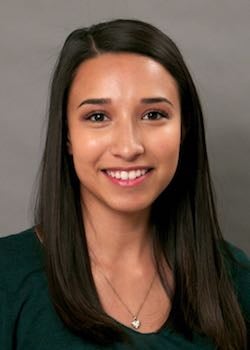
Jessica Campos
Jessica Campos
Bachelor of Science degree in mathematics with a secondary education teaching certification
Springerville, Arizona
Q: What are your plans after graduation?
A: After graduation I will attend Duquesne University in Pittsburgh, Pennsylvania, as a 2019 Woodrow Wilson Teaching Fellow to pursue my master's.
Q: What’s something you learned while at ASU — in the classroom or otherwise — that surprised you, that changed your perspective?
A: During the second semester of my freshman year at ASU, I enrolled in Dr. Marilyn Carlson’s MAT 207 course. Before beginning my college career, I thought that teaching math was going to be easy and that I would simply be able to show students how I learned it and they would follow along and instantly understand! I now know that in order for students to truly learn and grow, I cannot confine them to my own acquisition of knowledge and understanding. The Pathways to Calculus Curriculum co-developed by Dr. Carlson challenges teachers and students alike to reimagine mathematics in a new and more productive way. When I first encountered the Pathways Curriculum in Dr. Carlson’s course, I was very apprehensive to step outside of my own mathematical and pedagogical comfort zone. However, after witnessing classmates transform and discover their mathematical ability through innovative curriculum and discussions, I could not see myself approaching mathematics or teaching mathematics in any other way. I am very glad to have studied under Dr. Carlson and hope to cultivate the same mathematical mindset in my future classroom.
Q: Which professor taught you the most important lesson while at ASU?
A: During my time at ASU the most important lesson I learned was to embrace my personality. Dr. Jay Abramson was the very first professor I encountered at ASU during my summer as a student of the Joaquin Bustoz Math-Science Honors Program. Every day Jay (as he would insist we call him) would walk into the classroom and immediate take off his sandals at the front of the room. He would always stumble in one to two minutes before lecture began, somehow balancing a coffee thermos, a Rockstar energy drink, a huge messenger bag overflowing with papers, and a plethora of colored pens, highlighters and Dry Erase Markers in his hands. I had never encountered a more quirky teacher in my life. He was easily one of the best professors I have had the pleasure of taking at ASU, he was comfortable with his personality and that showed through his love for teaching and interacting with students.
Q: What’s the best piece of advice you’d give to those still in school?
A: The best piece of advice I can give to students is “Find purpose in your passion. If the path you choose makes you equally nervous and excited you will never get bored or become complacent with your life.”
Q: What is most misunderstood about mathematics by the general public?
A: Mathematics is generally misunderstood by the general public as a series of steps to be followed in a particular order to produce a solution. However, I believe that the beauty of mathematics lies in the mindset. All the equations and algorithms that are often associated with mathematics are all the result of centuries of meticulous arguments and theories developed by men and women who dedicated their lives to problem solving and exploration.
Q: Why is mathematics a great major for women to pursue in college?
A: The reason why math is a great major for women to pursue is because math is beautiful and loving to learn more about it doesn’t make you “nerdy,” it makes you fierce! Being a math major has empowered me both as a young woman and a Mexican American to have the confidence to challenge myself and try new things. Math is viewed by many as a difficult subject to study, so being one of the few people who have the opportunity to call themselves a “math major” I am honored to belong to such a unique, strong and intellectual community of scholars worldwide!
Q: What advice would you share with undergraduate women thinking of pursuing a math major?
A: Find value in failure. The most important lesson you can learn is to let yourself fail at something you really care about. Your academic abilities are not static or unchangeable, YOU have the power to develop new and stronger skills but only if you are willing to step outside your comfort zone and be faced with the possibility of failure.
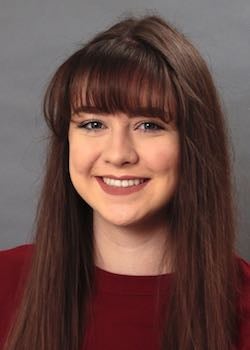
Hailey Walters
Hailey Walters
Bachelor of Science in actuarial science
Gilbert, Arizona
Q: What are your plans after graduation?
A: After graduation, I will be working an internship with Allstate Insurance in Chandler, Arizona. In the fall, I will be returning to ASU to pursue a master's degree in actuarial science. I'm excited to see what opportunities are in store for me beyond that!
Q: What’s something you learned while at ASU — in the classroom or otherwise — that surprised you, that changed your perspective?
A: I was surprised that my professors would be so willing to become invested in my education, career and growth. Once I discovered that each professor was so prepared to spend time answering my questions and helping me, it really solidified my decision to work towards a master’s degree for a chance to teach students in the future and help them in the same way.
Q: Which professor taught you the most important lesson while at ASU?
A: Dr. Jelena Milovanovic taught me many lessons that I will carry with me for the rest of my academic and professional life. I was able to participate in many of my college experiences that prepared me for real work thanks to her, and being around her has helped me develop my work ethic and leadership skills immensely.
Q: What’s the best piece of advice you’d give to those still in school?
A: I would highly recommend frequently taking a step back to enjoy being on campus. Take advantage of the events held for students, meet new people and go to sports events. Don’t be too focused on graduating too quickly just to look impressive.
Q: What is most misunderstood about mathematics by the general public?
A: The general public believes that mathematics is a concept that one either understands and is amazing at, or does not understand at all. The reality is that there are so many places in between where people can learn about the specific math that they are interested in and that applies to their lives, without having to get a degree in it.
Q: Why is mathematics a great major for women to pursue in college?
A: Mathematics is a great major for anyone to pursue because it can really prepare you for any role. The problem-solving and analytical skills that you learn in such a major will really benefit you anywhere you choose to work.
Q: What advice would you share with undergraduate women thinking of pursuing a math major?
A: I would tell others to never shy away from a challenge. You're capable of more than you know, and as long as you're confident and willing to put in the work, you will succeed beyond your expectations. Make friends with students in your math classes, because getting together to discuss things from multiple perspectives is always helpful. Don't forget to befriend your professors as well! They're here to help you and they're always willing to answer your questions; you just have to ask them! They want to see you succeed, too. So overall, my advice is to really make the best of your time in college, because it will be over before you know it.
Samantha Brozak
Samantha Brozak
Bachelor of Science in mathematics and a certificate in secondary education
Gilbert, Arizona
Q: What are your plans after graduation?
A: I’ll be teaching eighth grade math at Greenfield Junior High School. I’m very excited to show students how useful and fun math can be! This is a critical stage for students in their math education as well as their social, emotional and psychological development.
Q: What’s something you learned while at ASU — in the classroom or otherwise — that surprised you, that changed your perspective?
A: I learned that failure is a part of the process. There are going to be times where everything breaks and that is just science. It doesn’t mean you’re a failure, it just means you have to find a new perspective or another paper or different process.
Q: Which professor taught you the most important lesson while at ASU?
A: Dr. Abba Gumel, hands down. As a mentor, he always had high expectations and provided great advice. Dr. Gumel taught me to be confident in my abilities and rigorous in my work. He also knows all of the good coffee shops.
Q: What’s the best piece of advice you’d give to those still in school?
A: Branch out of your area of study and see where you can apply your knowledge in other fields, or just see what else you like! The most interesting work is collaborative, interdisciplinary work.
Q: What is most misunderstood about mathematics by the general public?
A: “Math people” are a pervasive myth. No one is born a “math person.” It takes practice, patience, and curiosity, just like any other skill or hobby. Math isn’t finished yet, either! I told my seventh graders I did mathematical research and they just couldn’t comprehend that we don’t know everything about math yet.
Q: Why is mathematics a great major for women to pursue in college?
A: Math is more than just crunching numbers. The tools and skills I gained from my math major are invaluable. I’ve learned mathematical concepts that are relevant in tons of fields. However, I’ve also learned how to be resourceful, persistent, precise and methodical. Most importantly, I now know that I can handle whatever is thrown at me, whether that’s a math problem I’ve been working at for hours or an unruly student who refuses to learn.
Q: What advice would you share with undergraduate women thinking of pursuing a math major?
A: You don’t have to be a “math person,” those don’t exist. Math takes practice just like anything else. Ask questions. Be disciplined, but don’t forget to sleep. It will catch up with you. Be persistent. Learn to code, even if it’s just to check your work. It’ll open up tons of doors when paired with a math major.
Sometimes, you may be one of five of women in a 40-person lecture hall. You are just as capable as anyone in that room. If you don’t see anyone who looks like you, pave the way and be the person you needed, whoever that is.
More Science and technology

Ancient sea creatures offer fresh insights into cancer
Sponges are among the oldest animals on Earth, dating back at least 600 million years. Comprising thousands of species, some with…

When is a tomato more than a tomato? Crow guides class to a wider view of technology
How is a tomato a type of technology?Arizona State University President Michael Crow stood in front of a classroom full of…

Student exploring how AI can assist people with vision loss
Partial vision loss can make life challenging for more than 6 million Americans. People with visual disabilities that can’t be…
